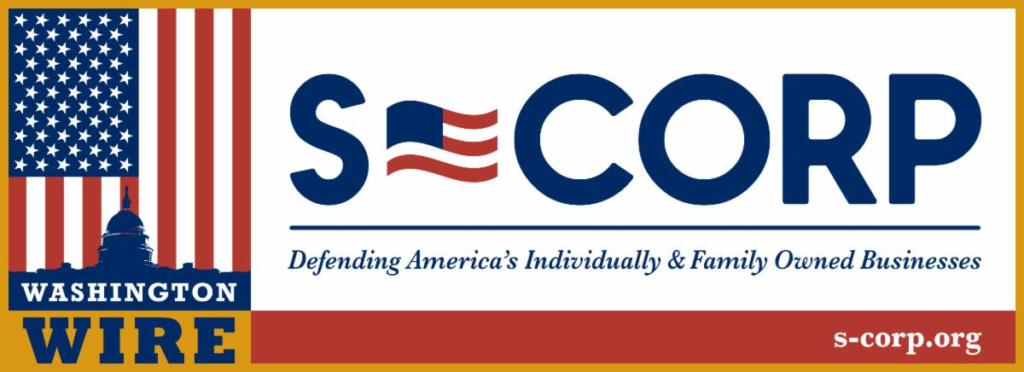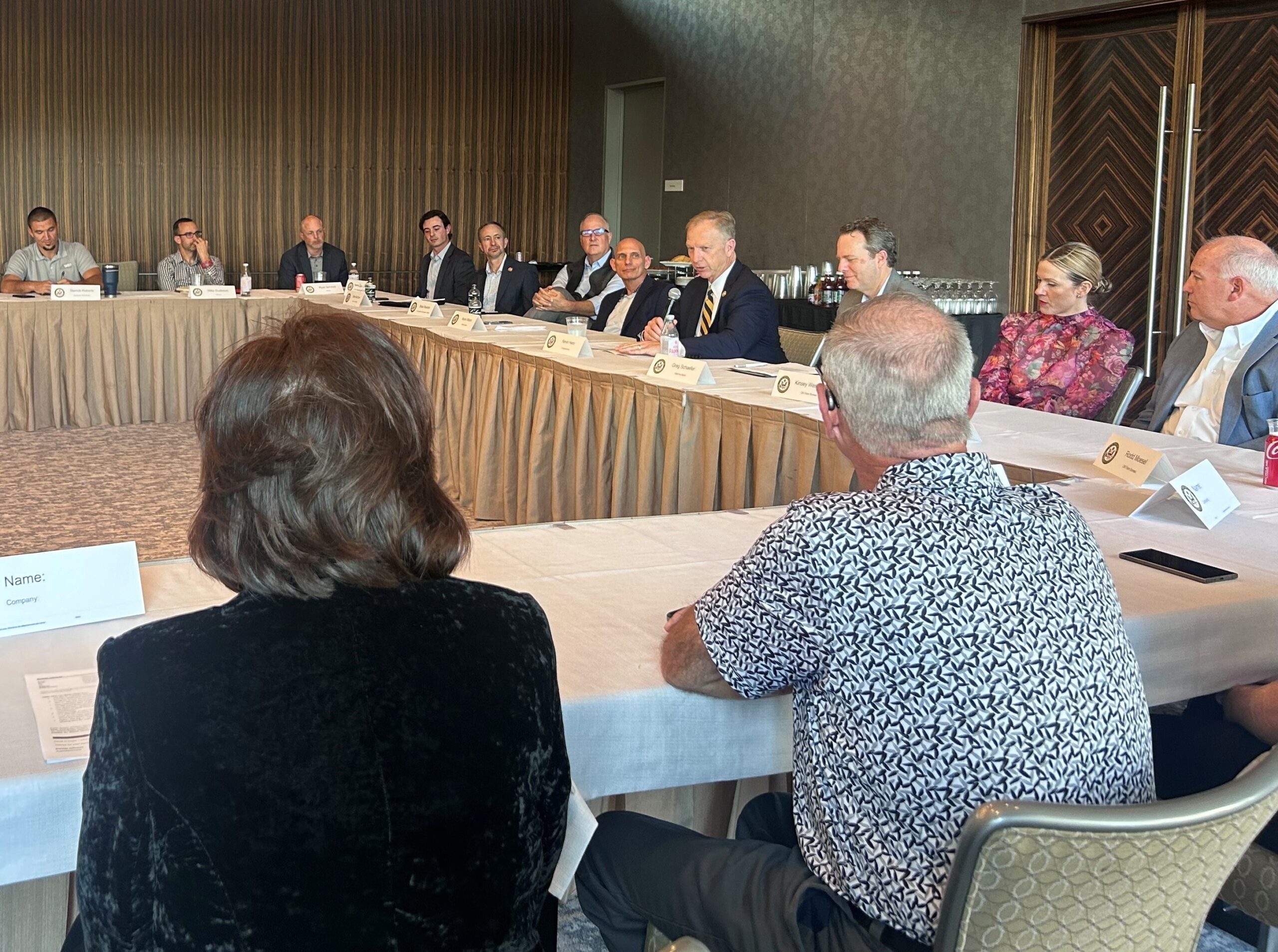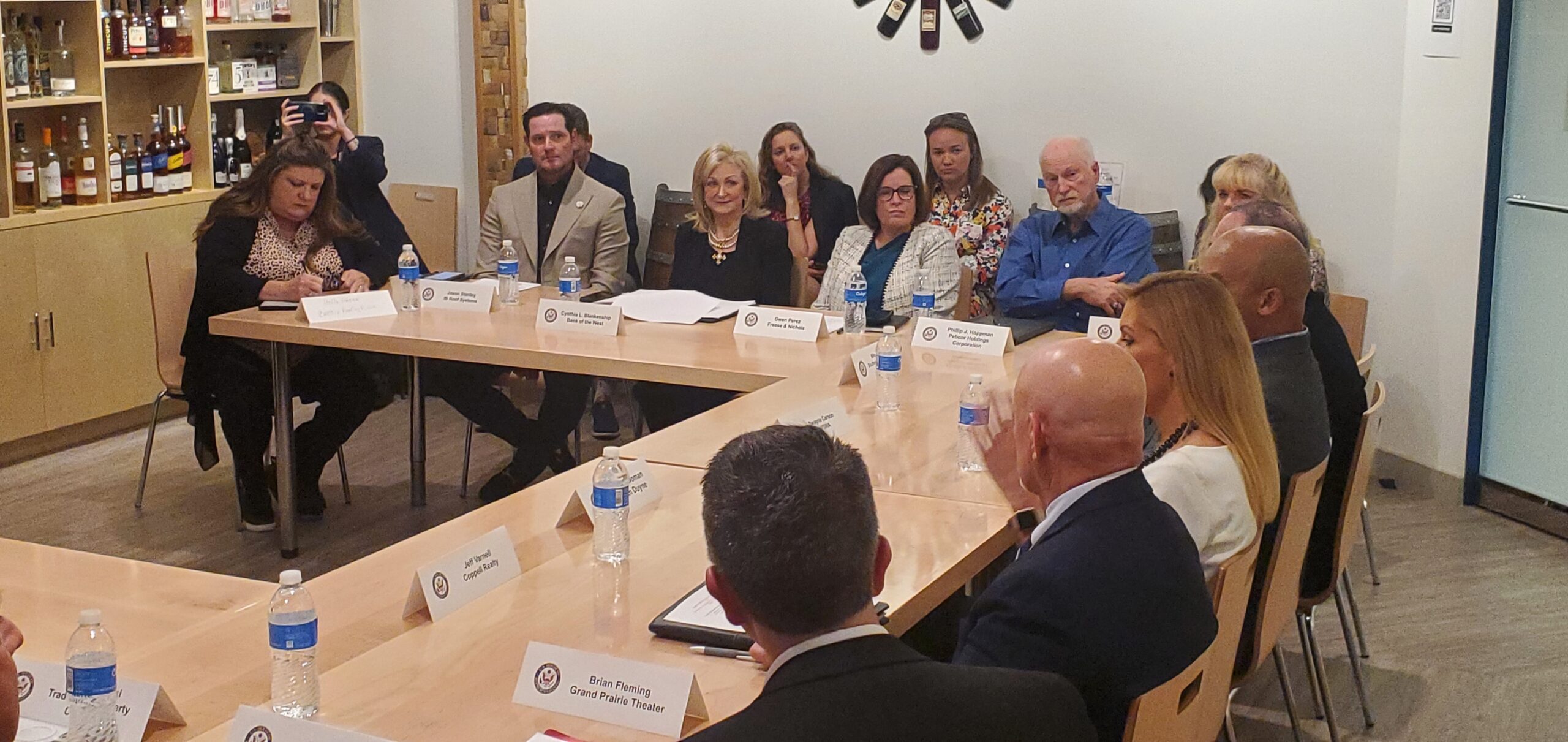Congressman Hern Hosts 199A Roundtable
The Main Street Employers Coalition gathered in Oklahoma City earlier today for a roundtable discussion with Congressman Kevin Hern, himself a former pass-through owner and an original cosponsor of our 199A permanence bill.
It was a perfect venue for the gathering. Nearly two out of every three private sector jobs in Oklahoma are supplied by pass-through businesses who rely on 199A to reinvest in their workers and their communities, all while remaining competitive with larger publicly traded companies.
It’s the sixth event the group has helped organize over the past few months (see here, here, here, here, and here), all with the goal of spreading the word about the importance of making permanent the Section 199A deduction.
Congressman Hern set the tone of the meeting early, referencing his own experiences as a business owner and the challenge the Main Street community faces with the looming expiration of the 199A deduction and accompanying lower rates.
On hand were 25 owners and representatives from local establishments operating in many industries, including banking, retail, restaurant, manufacturing, engineering, farming, and contracting. The diverse attendance was yet another reminder that private and family-owned companies are the heart of local economies in Oklahoma and nationwide.
Despite the outsized positive impact Section 199A has on these employers, the deduction is scheduled to expire at the end of next year. The roundtable was organized to highlight this challenge and provide real-world examples of what the deduction means for these companies, and how it has helped them in an increasingly difficult period.
S-Corp is grateful to Congressman Hern for leading this event and we look forward to continuing to work with him to see this important legislation enacted.
CTA Update | October 23, 2024
Notable Developments
- Request for Signatories: Member letter to FinCEN
- FinCEN says tech issues are your fault
- Updated FAQ limits CTA exemption
- HOAs have their day in court
- TD Bank case shows the current system works
Legislative Update
Congresswoman Lisa McClain is circulating a letter (linked here) requesting that FinCEN delay the CTA’s year-end reporting deadline and is requesting support from additional offices. Word is Financial Services Committee member French Hill (R-AR) has signed on.
For staffers whose bosses would like to sign as well, please contact the Congresswoman’s LD Erik Kinney at Erik.kinney@mail.house.gov. To ensure we have a strong show of support we also ask that any other stakeholders contact their representatives and ask if they would consider being listed as a signatory.
Thank you in advance!
TD Bank Exposes CTA Weakness
When people ask us how we would attack money laundering, our answer is abandon the useless data grab and focus on risk-based policies that follow the money instead.
Case in Point: TD Bank made headlines last week that it was facing hefty fines and penalties after failing to prevent some $670 million in laundered funds from moving through its accounts. Per a DOJ press release:
TD Bank N.A. (TDBNA), the 10th largest bank in the United States, and its parent company TD Bank US Holding Company (TDBUSH) (together with TDBNA, TD Bank) pleaded guilty today and agreed to pay over $1.8 billion in penalties to resolve the Justice Department’s investigation into violations of the Bank Secrecy Act (BSA) and money laundering.
TDBNA pleaded guilty to conspiring to fail to maintain an anti-money laundering (AML) program that complies with the BSA, fail to file accurate Currency Transaction Reports (CTRs), and launder money. TDBUSH pleaded guilty to causing TDBNA to fail to maintain an AML program that complies with the BSA and to fail to file accurate CTRs.
All this from systems currently in place – systems the CTA sought to weaken!
According to the settlement, TD Bank willfully failed to implement and maintain their AML program and neglected to file Suspicious Activity Reports (SARs) on thousands of suspicious transactions. The CTA tried to replace the SARs regime – a regime where banks directly file reports on suspicious activities within their accounts – with its far less reliable general self-reporting scheme, in effect shifting the compliance burden from the large banks to their small business customers while reducing the overall effectiveness of the program. Not good.
Regulatory Update (Part 1)
A recent post from K&L Gates highlights a troubling warning from FinCEN when it comes to filing BOI reports:
However, as we quickly approach year end, that compliance window continues to shorten, Reporting Companies should ensure that they have positioned themselves to meet the 1 January 2025 filing deadline. We note that the analysis for reporting under the CTA can be complex and time consuming and one that must be done on an entity-by-entity basis. FinCEN has said that it cannot rule out potential technical issues or website outages due to the expected high volume of filings the last two weeks of the year. FinCEN’s stated position is that a potential failure or difficulties of their system to accept filings for technical reasons will not excuse late filings. As such, the CTA should remain a priority well before the last few weeks of the year to allocate sufficient time to determine which entities may be Reporting Companies and to prepare any required filings, and we are encouraging our clients to file sooner rather than at the last minute.
FinCEN is worried its systems won’t be able to handle high volumes come year-end but is preemptively putting the blame on filers.
Regulatory Update (Part 2)
FinCEN also quietly moved the goalposts when it updated its BOI FAQs to reflect a new position regarding the large company exemption. Here’s Piliero Mazza with the summary:
One of the requirements causing headaches for many businesses is the “operating presence at a physical office in the United States”—many companies abandoned their physical office space during COVID. A number of clients have inquired whether a home office in a personal residence qualifies as a “physical office” under the exemption. For a personal residence to qualify as the “physical office,” the entity that qualifies for the exemption must itself lease or own the physical location, regularly conduct business at that location, and the location must be physically distinct from the place of business of any other unaffiliated entity. Thus, a company must actually rent or own the space in the personal residence that it uses to qualify for the large operating company exemption.
In a post-covid world where remote work is increasingly becoming the norm, this is yet another example of how challenging CTA compliance will be.
Legal Update
The Community Associations Institute, the group representing Homeowners Associations across the country – yes, homeowners associations must file under the CTA, too – presented oral arguments in their case before the US District Court for the Eastern District of Virginia. As we’ve written previously, this is one of several cases proceeding across the country, all with the goal of shutting down the CTA’s reporting requirements before the start of 2025.
As a reminder, there are now nine cases in various courts across the country challenging the validity of the CTA. Here are the links:
- Alabama (appealed): NSBA et al v. Yellen (11/15/2022)
- Ohio: Robert J. Gargasz Co., L.P.A. et al v. Yellen (12/29/2023)
- Michigan: Small Business Association of Michigan et al v. Yellen (3/1/2024)
- Maine: William Boyle v. Yellen (3/15/2024)
- Texas: NFIB et al v Yellen (5/28/2024)
- Massachusetts: BECMA et al v Yellen (5/29/2024)
- Oregon: Firestone v Yellen (6/27/2024)
- Utah: Taylor v Yellen (7/29/2024)
- Virginia: Community Associations Institute v. Janet Yellen (9/10/2024)
Congresswoman Beth Van Duyne Hosts Texas Roundtable on 199A
Members of the Main Street Employers Coalition today joined Congresswoman Beth Van Duyne to discuss the critical role the Tax Cuts and Jobs Act (TCJA) and its Section 199A Main Street business deduction have played in driving investment and supporting job creation. It was the fifth event (see here, here, here, and here) we’ve helped organize under the Ways & Means tax teams banner, an effort initiated by committee Chairman Jason Smith aimed at soliciting feedback from businesses affected by the looming fiscal cliff.
The event kicked off with a tour of Republic National Distributing Company’s (RNDC) expansive warehouse, showcasing how the company has continued to grow and contribute to the community, thanks in part to the tax reform provisions. Participants then convened for an in-depth roundtable discussion centered on how Section 199A has enabled them to reinvest in their businesses.
The attendees were emblematic of the broader Main Street community nationwide and represented a wide array of sizes and industries. On hand were roofers, electrical contractors, property managers, a theater establishment owner, and others. It confirms what we’ve said many times before: private companies are the heart of local economies nationwide.
One participant highlighted how the Section 199A deduction allowed them to expand operations, creating jobs and boosting local economic activity. Another noted that the additional resources freed up by the deduction were directed toward pay increases and contributions to local charities, underscoring the tangible benefits of the policy for both businesses and their surrounding communities.
For more data showing the economic contribution of the pass-through sector be sure to download our new mobile app
The conversation also turned to the consequences of allowing the tax provision to expire. Business owners expressed concern that without the Section 199A deduction, the increased tax burden would stifle growth, limit their ability to hire, and reduce contributions to their communities.
Congresswoman Van Duyne emphasized her commitment to preserving the Main Street business deduction, noting its importance to the Texas economy and small businesses nationwide. She reaffirmed her support for policies that empower local businesses, maintain job growth, and strengthen the broader economic landscape.
The roundtable concluded with a call to action for lawmakers to extend the Section 199A deduction, ensuring that Main Street businesses can continue to thrive and contribute to the communities they serve. S-Corp thanks the Congresswoman – an original cosponsor of our 199A permanence bill – for hosting this event and we look forward to continuing to work with her to see this important legislation enacted.
Tax Teams Comment Summary
Back in April, Chairman Jason Smith announced the formation of ten tax teams designed to identify legislative solutions to avert the coming 2025 fiscal cliff.
In addition to engaging directly with Main Street employers through hearings and roundtables (see here, here, here, and here), the effort requested feedback from stakeholders as to their priorities for the coming year. S-Corp and its allies responded with numerous comments, including:
- Main Street Comments on Section 199A
- S-Corp Comments on Section 199A and other Priorities
- S-Corp Comments on International Tax Changes
- S-Corp Comments on Excess Loss Provisions
With the submission deadline closing today, here’s a quick recap of our comments and the key issues we face heading into next year.
199A Permanence
S-Corp joined with its allies in the Main Street Employers Coalition to press for making Section 199A permanent before it expires come the end of next year:
The Main Street Employers Coalition (MSEC) is comprised of dozens of trade associations representing businesses operating in virtually every industry and community across the country. The vast majority of these businesses are structured as pass-throughs – S corporations, partnerships, and sole proprietorships – and they rely on the Section 199A pass-through deduction to help them grow, create jobs, and remain competitive.
Getting 199A made permanent is going to be a big challenge. The good news is that the Main Street Tax Certainty Act has garnered unprecedented levels of support. In the House, the bill led by Congressman Lloyd Smucker has 191 cosponsors, while Senator Steve Daines’ companion legislation has support from 34 cosponsors. There’s work to be done, particularly after the November elections, but the support shows lawmakers fully grasp the situation and are prepared to prevent a tax hike on tens of millions of Main Street businesses next year.
S-Corp Priorities
S-Corp comments to the Main Street tax team highlight the fact that the pass-through deduction supports 2.6 million jobs – jobs that would be at risk if Congress allows the deduction to expire at the end of next year:
A recent study by EY highlights this point. According to EY, Section 199A supports 2.6 million jobs, contributes $161 billion to employee compensation, and adds $325 billion to the national economy. Regarding jobs, the study finds Section 199A supports 1.1 million jobs directly, 590 thousand jobs through increased employee compensation, and another 853 thousand jobs from related consumer spending increases. These results highlight the importance of Section 199A to the economy and how the expiration of the deduction threatens these jobs. Absent congressional action, 2.6 million jobs will be at risk.
The letter raises other concerns. If Congress fails to act, the numerous permanent base-broadening provisions included in the TCJA will, absent the offsetting lower rates, raise taxes on millions of Main Street businesses – higher taxes relative to the pre-TCJA baseline.
The comments also make the case for why Congress should oppose the Biden Net Investment Income Tax (NIIT) tax hike and instead support our S Corp Mod legislation. Finally, they make the case for SALT Parity and the pass-through entity tax enacted by 36 states in recent years.
As with our other submissions, these comments are a reminder that next year’s looming tax hikes present not just a challenge, but also an opportunity to improve the rules that govern S corporations.
Global Competitiveness
The S corporation community has a large international presence, and it faces significant challenges under the new, territorial tax system. As our comments to the Global Competitiveness Tax Team state:
The TCJA set the foundation for a more competitive international tax system. Next year’s fiscal cliff is an opportunity to build on that foundation and fix several imbalances in the treatment of S corporations and other pass-through businesses that operate internationally. It is also an opportunity to address pending challenges with the Pillar 2 process and make certain that family businesses are not penalized for how they are organized.
Specific challenges identified in the comments include:
- The pass-through deduction (Section 199A) is applicable to domestic income only.
- S corporations are excluded from the TCJA’s territorial treatment and must pay tax on their foreign source income immediately (even if they are organized as a CFC) and at the highest marginal rates.
- The Pillar 2 world-wide minimum tax has the potential to double tax the domestic and international earnings of S corporations and other pass-throughs.
To fix these challenges, the comments recommend the Section 199A deduction be expanded to include foreign-source income, the TCJA territorial system be expanded to fully include pass-through businesses, and the Pillar 2 pass-through carve-out be expanded to include S corporations and other pass-through businesses with indirect owners.
Excess Loss Limitations
Finally, S-Corp submitted comments on the TCJA’s Excess Loss Rules. This provision targeted pass-through businesses solely and has been the subject of much controversy, most particularly due to the wildly inaccurate scoring that accompanied its consideration. It’s also a solution in search of a problem. As our comments note:
What makes the new loss limitation even more perplexing is that it serves no useful policy purpose. Instead, Section 461(l)’s excess-business-loss limitation violates a foundational income tax precept by preventing a taxpayer from netting all of the costs of producing income against gross receipts. In so doing, the new rule causes such a taxpayer to be taxed on an amount greater than their income. Indeed, in some cases, it requires a taxpayer to pay federal income tax even though the taxpayer incurs a loss for the year. This accelerates negative economic impacts and slows economic recovery by delaying loss deductions at least a year.
The comments make three recommendations for fixing this errant policy – proactively repeal the Section entirely, allow it to sunset as scheduled starting in 2029, or, failing those, mitigate its harm by allowing capital gains invested back into the business to be netted out against any losses.
Conclusion
As the Committee website makes clear, the tax teams process has generated an enormous amount of welcome attention and study regarding the challenge of next year’s fiscal cliff. S-Corp appreciates the tireless efforts of Chairman Smith and the members of the Ways & Means tax teams. We’re grateful for the opportunity to share these perspectives and look forward to working with them to secure a favorable outcome next year.
Arrington Talks 199A and Chamber Hits Hill
Couple of items worth highlighting on the Section 199A front. First, House Budget Committee Chair Jodey Arrington (R-TX) joined CNBC’s Squawk Box yesterday to talk fiscal cliff and the ever-growing budget deficit. Asked by host Andrew Ross Sorkin whether going to a corporate tax rate of 15 percent “is the right answer,” Arrington replied:
I’m more interested in locking in permanent small business tax breaks that will expire at the end of next year, like the 20-percent 199A deduction, where Kamala Harris, in her tax proposal, would allow that to expire. When she says she won’t allow taxes to go up on anyone making less than $400,000, that’s simply not true.
Given the outsized role played by pass-throughs in the American economy, it makes sense for Congress to focus on these Main Street businesses. Kudos to Chairman Arrington for driving home this point and making the case for 199A permanence.
Meanwhile, the Chamber of Commerce’s Small Business Council was in town to talk up 199A permanence this week. Here’s Politico with the coverage:
Congress may be gone for another month or so, but preparations for next year’s tax cliff are still underway, with the U.S. Chamber of Commerce flying in more than 50 members of its Small Business Council on Tuesday to discuss the stakes for small businesses in the tax fight.
— Small business owners met with staff from House and Senate offices from the Arizona, Utah, Illinois, Maryland and Virginia delegations, to whom they sought to make the case for preserving the 20 percent deduction for pass-through businesses; a low corporate rate and the research and development credit. The Small Business Council plans on heading back to the Hill early next year to lobby the new Congress.
The fact that these conversations are taking place well in advance of the 2025 fiscal cliff highlights just how much is at stake and the importance of getting the word out to lawmakers. S-Corp and its allies have been similarly engaged, hosting various roundtables with members of the Ways & Means Committee’s tax teams, submitting comment letters highlighting our various policy priorities, and regularly meeting with Members and staff. We look forward to continuing these efforts and securing a favorable outcome next year.
Finally, Juniper Research Group CEO Chris Jacobs has a great piece in the Wall Street Journal on the Section 199A deduction. It reads in part:
In 2021 nearly 26 million households used the qualified business income deduction, according to the latest Internal Revenue Service data, covering returns filed in 2022. Most of them are middle class. Among households claiming the deduction, 20 million reported adjusted gross income below $200,000, claiming an average $2,811 write-off. An additional 4.3 million households using the deduction reported adjusted gross income between $200,000 and $500,000, claiming a deduction averaging $9,194.
Despite the many households claiming the qualified business income deduction and the substantial savings to small-business owners, Ms. Harris hasn’t publicly committed to renewing it when it expires at the end of 2025. If the deduction lapses, the entrepreneurs Ms. Harris said “invest in the middle class” would face tax increases of hundreds or thousands of dollars a year.
As Jacobs points out, the Harris proposals to help small businesses are tiny in comparison to the threat they face from higher rates and the loss of 199A next year. For truly pro-business representatives, supporting Section 199A permanence is a no-brainer.





